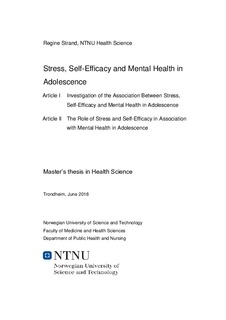| dc.contributor.advisor | Espnes, Geir Arild | |
| dc.contributor.advisor | Moksnes, Unni Karin | |
| dc.contributor.author | Strand, Regine | |
| dc.date.accessioned | 2018-10-15T11:21:01Z | |
| dc.date.available | 2018-10-15T11:21:01Z | |
| dc.date.issued | 2018 | |
| dc.identifier.uri | http://hdl.handle.net/11250/2568011 | |
| dc.description.abstract | This master’s thesis investigated the theoretical and empirical background on stress, self-efficacy and mental health in adolescence, and a quantitative investigation of the role of stress and self-efficacy in association with mental health outcomes in adolescence was conducted. The thesis contains a description of the adolescent period and mental health, as well as conceptualizations and definitions of stress and self-efficacy. Further, it contains a review of the empirical findings regarding the relationship between the constructs. Empirical evidence suggests that there are relationships between stress, self-efficacy and mental health, and that they influence one another.
Results from the quantitative analyses showed significant sex differences. Girls reported higher levels of stress and lower levels of general self-efficacy than boys, and lower levels of mental well-being and higher levels of symptoms of depression than boys. A significant positive association was found between self-efficacy and mental well-being, and between stress and symptoms of depression. A significant negative association was found between self-efficacy and symptoms of depression, and between stress and mental well-being. Self-efficacy was especially important to explaining the variance in mental well-being, whereas stress was especially important to explaining the variance in symptoms of depression. | nb_NO |
| dc.description.abstract | Denne mastergradsoppgaven undersøkte den teoretiske og empiriske litteraturen om stress, mestringstro og psykisk helse i ungdomstiden, og en kvantitativ undersøkelse av betydningen av stress og mestringstro i forhold til psykisk helse i ungdomstiden ble utført. Oppgaven inneholder en beskrivelse av ungdomstid og psykisk helse, og konseptualiseringer og definisjoner av stress og mestringstro, i tillegg til en gjennomgang av empiriske funn på forholdet mellom konstruktene. Empiriske funn antyder at det er assosiasjoner mellom stress, mestringstro og psykisk helse, og at de påvirker hverandre.
Resultatene av de kvantitative analysene viste signifikante kjønnsforskjeller. Jenter rapporterte høyere nivåer av stress og lavere nivåer av mestringstro enn gutter, og lavere nivåer av psykisk velvære og høyere nivåer av symptomer på depresjon enn gutter. Det ble funnet en signifikant, positiv assosiasjon mellom mestringstro og psykisk velvære og mellom stress og symptomer på depresjon. Det ble funnet en signifikant, negativ assosiasjon mellom mestringstro og symptomer på depresjon og mellom stress og psykisk velvære. Mestringstro forklarte mest av variansen i psykisk velvære, mens stress forklarte mest av variansen i symptomer på depresjon. | nb_NO |
| dc.language.iso | eng | nb_NO |
| dc.publisher | NTNU | nb_NO |
| dc.relation.haspart | Investigation of the Association Between Stress, Self-Efficacy and Mental Health in Adolescence | nb_NO |
| dc.relation.haspart | The Role of Stress and Self-Efficacy in Association with Mental Health in Adolescence | nb_NO |
| dc.title | Stress, Self-Efficacy and Mental Health in Adolescence | nb_NO |
| dc.type | Master thesis | nb_NO |
| dc.subject.nsi | VDP::Medisinske Fag: 700::Helsefag: 800 | nb_NO |
